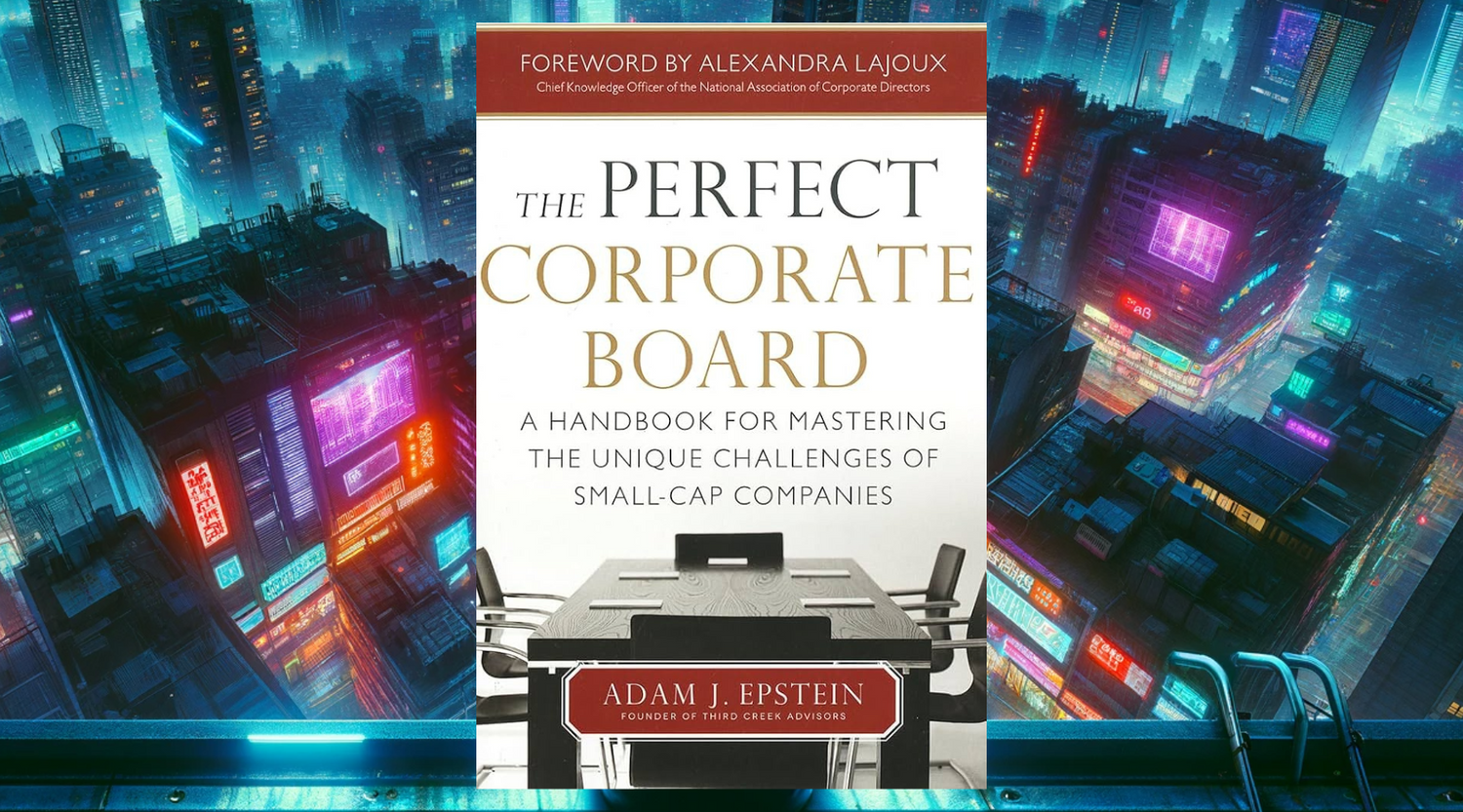The Perfect Corporate Board: A Handbook for Mastering the Unique Challenges of Small-Cap Companies
Book Summary & Review
From a trader’s perspective, understanding a company's financial situation and how they can take advantage of financing opportunities, is an extremely relevant and under-utilized strategy in small cap trading. My personal day-trading style revolves around small cap companies that are in dire need of raising capital. This book goes through all the ways that a company can do this, and the pros and cons of each different type of fundraising, including PIPEs, public offerings, convertible notes, warrants, etc…
The key benefit from reading this book for me was gaining a better understanding of what’s going on inside the company and the minds of their corporate boards when they are trying to put together a round of funding.
“Small-cap directors are regularly beset by a treadmill of sorts that always seems to move a little faster and a little more uphill – raising sufficient growth capital on the least dilutive terms to fund current operations, and then taking the necessary steps to position the company for future such financings. And, in many cases, they do that again and again.” ~ Adam Epstein, The Perfect Corporate Board
This book wasn’t written for small cap traders, but the insights into the small cap company boards is just what someone would need to help analyze these companies.

There’s also quite a few great explanations of how these small cap companies use filings to disclose financing or to put out fluff news.
“Since many small-cap financings are highly dilutive to shareholders, companies sometimes opt for announcing financings via Form 8-K as opposed to a press release. The thinking in this regard is that a Form 8-K filing is likely to garner less attention than a press release – put bad news in a Form 8-K, and reserve press releases for better information. Investors understand the difference; it is uniformly understood in the investing community that when a company announces a financing via Form 8-K instead of a press release, the company knows it’s not a great result for shareholders, and it’s attempting the capital markets version of hiding.” ~ Adam Epstein, The Perfect Corporate Board
The Perfect Corporate Board: A Handbook for Mastering the Unique Challenges of Small-Cap Companies
A practical guide to effective corporate governance for smaller public companies. Learn how to build and manage a board of directors that drives value creation, ensures compliance, and navigates the unique challenges facing small-cap enterprises in today's regulatory environment.
View on AmazonThe book goes into the Pros and Cons of each type of financing option available to these companies, as well as what could prevent the company from having access to each type, such as liquidity, hedging, pricing, and structure. Here’s a list of the financing structures most commonly utilized by small-cap companies in order from most common to least common (as of 2013 publish date):
- Restricted Common Stock: PIPEs (To learn more about PIPEs, check out this book summary of PIPEs: Private Investment in Public Equity)
- Registered Common Stock: Fully Marketed Follow-On Offering
- Convertible Preferred Stock
- Convertible Note
- Registered Common Stock: At-The-Market Offering (ATM)
- Registered Common Stock: Equity Line
- Registered Common Stock: Registered Direct
- Registered Common Stock: Confidentially Marketed Public Offering (CMPO)
Here’s a few other topics covered in The Perfect Corporate Board:
- Small caps communication strategies
- IPO’s
- Reverse Splits
- Stock buy-backs
- Equity research
- Earnings calls
- Investment banking
- Investor relations
- Post Financing mistakes
This was a quick read, and I really recommend it for anyone on a corporate board or for anyone that trades small cap company stocks.
If you enjoyed this summary, I’d suggest checking out my book review and summary of Sold Short: Uncovering Deception in the Markets










Leave a comment
This site is protected by hCaptcha and the hCaptcha Privacy Policy and Terms of Service apply.